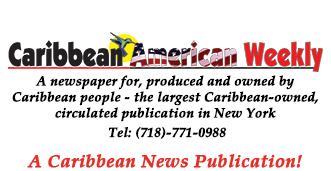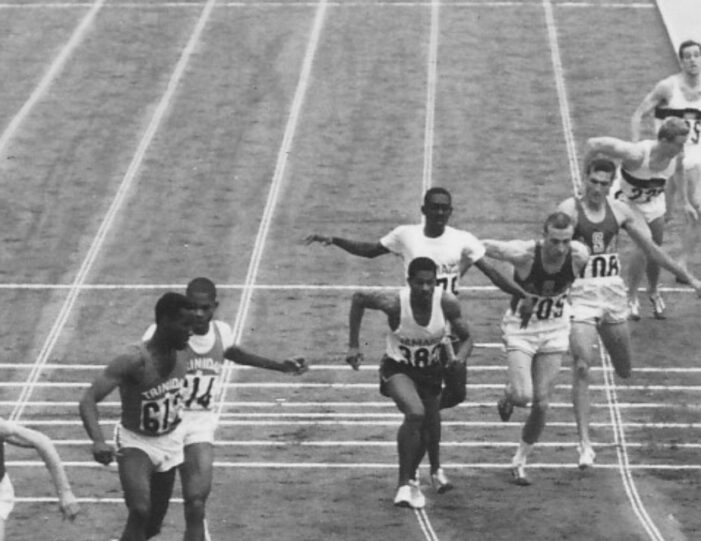By Trevor M. Millett
The journey of every Olympian to that athletic world stage is never an easy one. There is training. Training. Forever training. Competition after competition after competition. At times exhausted, nerves slightly frayed, but there is never any let-up. There must be consistency of form and performance. Attitude and mindset must be just right. One too many slip-ups will mean certain elimination from the ranks of the best the world will gather to admire and applaud every four years.
Like other Olympic Games preceding it, the 1964 Tokyo Games brought together the fastest, the strongest and the most proficient athletes of the time. Among those pursuing glory at those games was an elite athletic group in the persons of Edwin Roberts, Edwin Skinner, Kent Bernard and Wendell Mottley from newly independent Trinidad and Tobago.
Individually and collectively, they were mighty forces of track and field. By the time they had arrived at the Tokyo venue, they had already established impressive track records and reputations. They were all world-ranked in the demanding 400-meter track event. At the time, Wendell Mottley in particular was burning up the tracks indoors and out in the 400-meter event while Roberts made it clear that he was not to be trifled with in the 200 meter event as well.
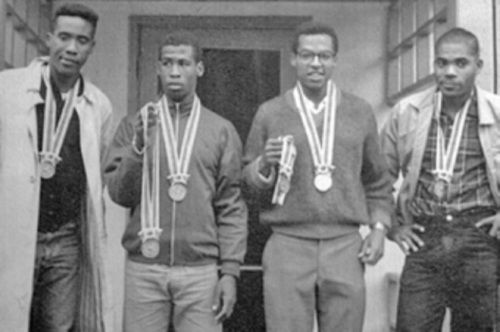
Indeed, Track and Field News had taken note of their capability and dared to predict that they would medal in the 4×400 meter relay.
But physical form and readiness must be harmoniously blended to produce the right result on the track. Readiness involves not only fitness of the body but also fitness of the mind and the right emotional state. For the four star athletes from Trinidad and Tobago, maintaining their psychological and emotional well-being was not always easy.
They were largely responsible for their own success in upkeeping their physical condition, reaching their peak form and getting to the tracks in Tokyo. University students at the time, all of them based in America, with little disposable income at hand and no official financial support readily available, they had to ensure, on their own, the quality of their diet and the level and kind of training they were undergoing in preparation for Tokyo.
From June to September 1964, none of them was involved in any structured training program. They worked mostly by themselves. Mottley was fortunate to have been invited to California to train but not compete with the US Olympic team stationed there. Thus, he was able to run on the best tracks before journeying to Tokyo. But money was always a haunting problem for the athletes. A gloomy cloud of uncertainty hung over their trip from America to Tokyo. Eventually the funds were made available to allow them to get to Tokyo. Nevertheless, they had pocket expenses to ensure they had Olympic-mandated matching track attire in order to compete. Then they had to deal with psychic and emotional issues. Not knowing whether they would actually make it to Tokyo, Kent Bernard suspended his training and suffered a decline in conditioning which became obvious to him when he took part in a meet in Vancouver, British Columbia, before winging his way to Tokyo.
At the Olympic venue, Bernard looked at the 80,000-packed stadium and wondered about his likely performance before such a massive international audience. He readily admits, “I lacked the confidence I had during track season.” However, the ease with which the team won their heats boosted Bernard’s outlook. He knew then that they would do well. Meanwhile, Edwin Skinner had his own issues. With typical humility, he acknowledged he was the slowest of the four-man relay team in Tokyo and therefore had to build his confidence and reassure himself that he could live up to expectations and meet the standard required for victory. The record holder for the 400 meter event at the time, American Adolph Plummer, had clocked a personal best in 1963 of 44.6. Skinner was running at 47 compared to the elite average of 46.8.
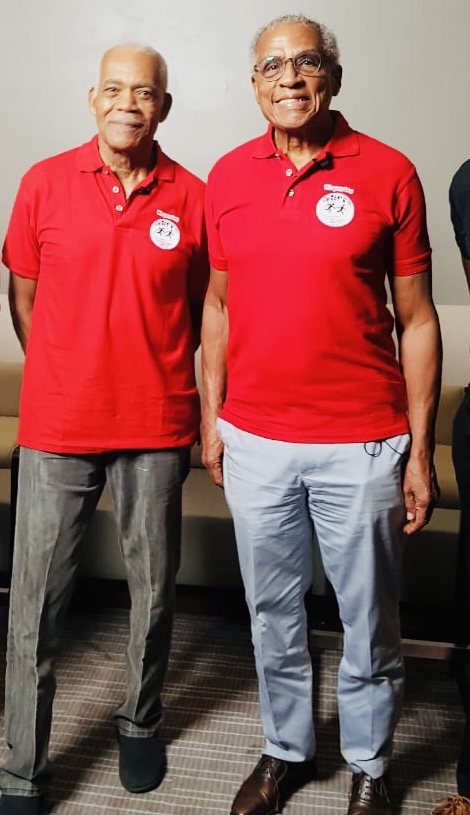
Roberts had his own concerns. Disturbed by the sub-standard treatment they were getting as athletes for Trinidad and Tobago, he had demanded that they be paid a per diem and provided with other assistance. Because of his firm stance on their treatment, he felt he had painted himself into a corner. He now felt duty-bound to run well in his events.
Roberts was concerned but not nervous. The approving roar of stadium crowds tended to energize him. His speed always matched their excitement. He will tell you, “When I run, I run with the crowd. I run with people. The noise gives me a lot of incentive to run fast.”
With Wendell Mottley it was different. He was basically composed, ready, willing and able. The consensus among them was that each man had to run like rushing wind to win his leg. A goal easier set than done, because all the members of the opposing relay teams probably had the same motto: “Win your leg!” since everybody was in it to win it.
On that autumnal October day of the Tokyo Summer Olympics—October 21, 1964 to be exact—the sound of the starting pistol signaled to Edwin Skinner, running the first leg, to rise up and make good the positive psychic and visualization therapy he had been practicing in order to medal in the 4×400 meter relay. His performance was not disappointing. Next, there was Kent Bernard, the second leg, who had banished all thoughts of failure from his mind when the time came for him to deliver. “Win your leg. Win your leg” was all that echoed in his mind.
Edwin Roberts, who captained the team, was excited by the performances of his mates, none more so than Mottley’s. Having received the baton safely from Bernard for the third leg, Roberts successfully passed it to Mottley. Then the unexpected happened. America’s third-leg sprinter, Ulis Williams, stumbled and fell in front of Mottley forcing Mottley to run around him and suffer a brief but costly delay. Precious silver-earning moments were lost because of that unanticipated hindrance slowing Mottley’s take-off.
Nevertheless, Roberts kept the faith. Pumping his tightly clenched fists above his head as he observed Mottley’s speed, he kept repeating to himself, “Silver or bronze. Bronze or silver.” Silver would prove elusive.
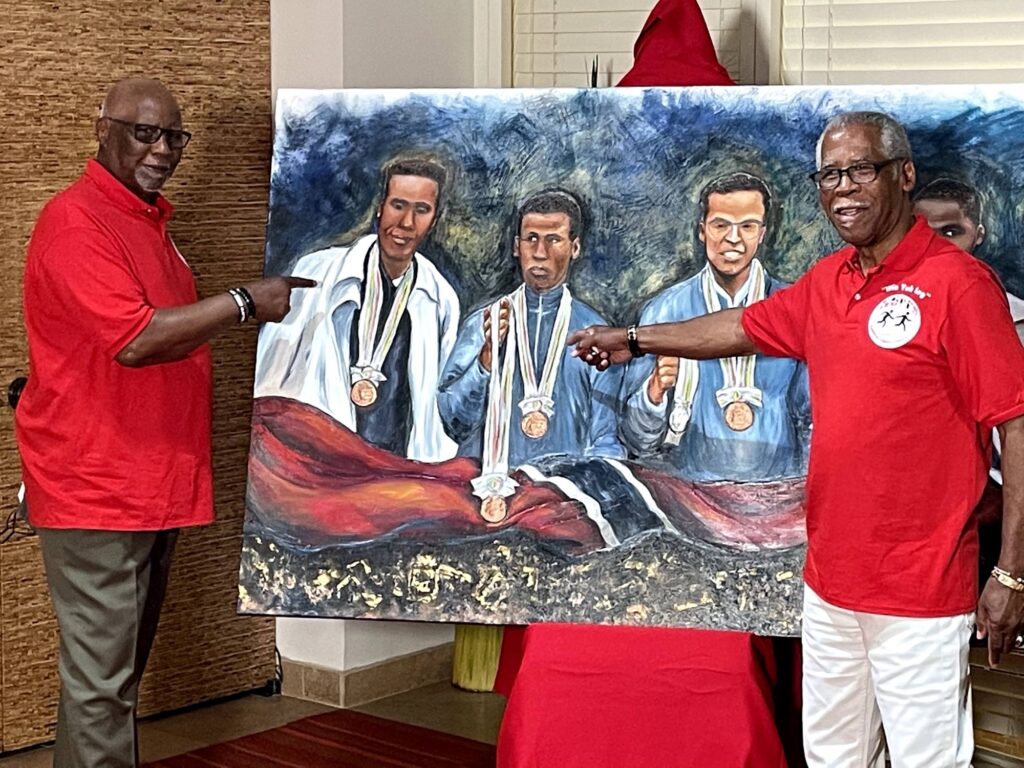
Even with his great speed, Mottley could not get past Henry Carr of the United States who headed the sprinters down the winning stretch, followed keenly by Robbie Brightwell of Great Britain, while Trinidad and Tobago, despite the setback, staked its claim to third place and the bronze.
Of the many benefits bestowed on the team by the Tokyo Olympics, enduring friendship has been one of them. The team spirit and camaraderie that developed among the four sprinters before and during the Tokyo Games forged permanent bonds of friendship among them. Ever so often, they look back and fondly remember.
Bernard is the 79-year-old, Roberts and Mottley are the 80-year-olds while Skinner is the 81-year-old. They all remain close. Still lively and very active to this day.
“We knew each other from competing in Trinidad,” observes Mottley. “But there was nothing so sweet as meeting together in those Games and competing, as a small country, against the rest of the world. That’s why we are friends today.”
The present-day photos are of Kent Bernard and Edwin Roberts at the Consulate General in New York; and Edwin Skinner and Wendell Mottley in Port of Spain, both taken on August 6, 2021, when the Consul General hosted the Virtual Reception in their honor. The event was produced by the 56ers Cultural Legacy Committee, named in their honor.
